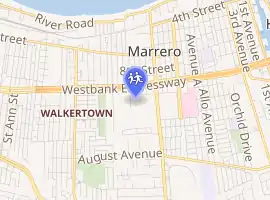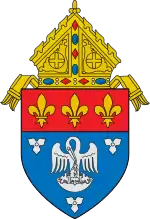Archbishop Shaw High School
Archbishop Shaw High School is an Archdiocesan school administered under the Salesians of St. John Bosco. It is approved by the Louisiana State Department of Education and the Southern Association of Secondary Schools and Colleges. Founded in 1962, it is located in Marrero, Louisiana, and is part of the Roman Catholic Archdiocese of New Orleans.
| Archbishop Shaw High School | |
|---|---|
 | |
| Address | |

| |
1000 Barataria Boulevard , 70072 United States | |
| Coordinates | 29°53′32″N 90°6′13″W |
| Information | |
| Type | Private |
| Motto | Excelsior (Ever Striving, Ever Achieving) |
| Religious affiliation(s) | Roman Catholic, Salesian |
| Established | August 19, 1962 |
| Founder | Archbishop Joseph Rummel |
| President | Fr. Louis Molinelli, SDB |
| Dean | Mark Williams |
| Principal | Fr. Louis Molinelli, SDB |
| Staff | 55 |
| Grades | 8–12 |
| Gender | All-Boys |
| Average class size | 19 |
| Student to teacher ratio | 13:1 |
| Campus size | 72 acres |
| Color(s) | Green and White |
| Athletics conference | Louisiana High School Athletic Association District 10-5A |
| Mascot | Eagle |
| Team name | Eagles |
| Rival | Archbishop Rummel Raiders |
| Accreditation | Southern Association of Colleges and Schools[1] |
| Newspaper | The Eagle Times |
| Yearbook | The Talon |
| Athletic Director | Tom Alef |
| Website | www.archbishopshaw.org |
History
Archbishop John W. Shaw, whose leadership of the Archdiocese New Orleans ran from 1918 to 1934, had a special interest in the Catholic community of the West Bank. During this time many churches and schools were founded. In that time, Hope Haven Institute, an orphanage and foster home for boys was founded and the Salesians of St. John Bosco were asked to staff it.
The mission of the Salesians is to serve the poor and the young through the Preventive System of St. John Bosco in light of the Gospel and Jesus Christ. In 1962 Archbishop Joseph Rummel of New Orleans dedicated a new high school on the West Bank and named it in honor of Archbishop Shaw. The school was built on the same 70-acre plot of land that was used by Hope Haven.
The Rev. Paul Avallone, SDB was the school's founding principal. Originally, only a small complex was built to meet the needs of the developing West Bank. Every year the school continued to grow in both admissions and infrastructure.
While Archbishop Shaw High School is the only school for boys on the West Bank, it also attracts students from all over southeast Louisiana.
Origins
The West Bank of Jefferson Parish did not have any Catholic High Schools prior to 1955, when Immaculate Conception parish of Marrero added Immaculata High School. It was envisioned to provide Catholic secondary education as an all-girls institution. However, the absence of an alternative for boys prompted parents to request admission of their sons. Immaculata accommodated and began admitting boys.[2] By 1959, Immaculata High School was fully established, graduating its first class of Seniors in 1960.
Responding to the rapid suburban growth of the New Orleans area, the New Orleans Archdiocese proceeded with the development of four new high schools to be established in Jefferson Parish, two on the west bank of the Mississippi River and two on the east bank. These included Archbishop Shaw for boys in Marrero; Archbishop Blenk for girls in Gretna; Archbishop Rummel for boys in Metairie; and Archbishop Chapelle for girls in Metairie.[3]
Archbishop Shaw High School began classes in August 1962, admitting only Freshman 9th grade students, all boys. Immaculata High School continued to provide secondary education for boys and girls, but the boys were phased out one class per year as Shaw added each successive grade. When Shaw opened, a number of male faculty members moved from Immaculata. Immaculata continued to graduate co-ed classes until 1966, when the final nine boys reached commencement.[2] The first graduating class of Shaw was in 1965, so for two years boys graduated from both high schools. After 1966, Immaculata continued as an all-girls secondary school.
Facilities
The campus of Archbishop Shaw was at first partially developed to accommodate a singular incoming class of Freshman 9th grade students. Ground was broken in October 1961, and included two annex buildings and a cafeteria.[4] Construction was completed in time for the 1962–1963 school year and the new school was dedicated on August 19, 1962. Ceremonies were officiated by Archbishop Francis Rummel and Archbishop John Cody.[5]
In 1965, the first major expansion of the campus facilities began. The project included a main building facing the West Bank Expressway with 12 classrooms, an administrative area, science laboratories and library and a separate gymnasium. In all, the additions were an investment of over $1.1 million (U.S.) raised by the United Catholic Education Fund.[6]
The school has expanded in the past 50 years to contain 4 academic buildings, 4 sport facilities (football, soccer, baseball, and wrestling), as well as a swimming pool.
The Anchor
Archbishop Shaw has historically incorporated an anchor in its logos, crests and insignias. Once established, the school organized a Navy Junior Reserve Officer Training Corps (NJROTC) that participated in local parades and competitions, adopting the name "Sea Eagles." In 1972, two of its members were selected for Navy Reserve Officer Training Corps scholarships at the collegiate level. They were also named first and second alternate appointments to the U.S. Naval Academy in Annapolis.[7]
In the 1976–1977 school year, the unit consisted of 53 cadets, 22 of which were on the drill team, under the direction of Lt. Cmdr. Hillary G. Parrish. Though the unit was successful, winning 17 awards in professional competitions that year, it was disbanded due to regulations that required a minimum of 100 members.[8]
For many years, a genuine ship's anchor that was placed because of the NJROTC served as an inspirational monument on the grounds of the school, next to the rectory. The anchor remains on campus and has a renewed purpose, since relocated to the entrance of the football stadium that was constructed on Shaw's campus in 2017. The anchor has been incorporated as part of the pre-game ritual of football games, where players touch the anchor for good luck.
Alma Mater
Sung to the tune of "Far Above Cayuga's Waters"
Near the banks of Old Man River, rising grandly there, stand the halls of Shaw forever gleaming bright and fair. See her glory, sing to praise her, Shaw will know we care. Brave her men proud to remember days of honor there.
Athletics
Joe Zimmerman Stadium
Joe Zimmerman Stadium is a 3,000-seat natural turf football/multipurpose stadium located on the campus of Archbishop Shaw.[11][12]
From 2018 to 2019, it was the home stadium for the New Orleans Gold of Major League Rugby under the branding of Gold Stadium.[13]
Notable alumni
- Bobby Barbier – head baseball coach of the Northwestern State Demons
- Gary Carter, Jr. – incoming Democratic member (2016) of Louisiana House of Representatives from Algiers neighborhood of New Orleans
- Ryan Clark – current NFL analyst at ESPN, retired NFL free safety, Pittsburgh Steelers and Washington Redskins
- Patrick Connick – state representative for Jefferson Parish
- John Fourcade – retired NFL quarterback
- Tory James – retired NFL cornerback
- Mickey Joseph – football wide receivers coach for the LSU Tigers
- Sammy Joseph – running backs coach for the Nicholls Colonels
- Vance Joseph – football defensive coordinator for the Arizona Cardinals and former head coach of the Denver Broncos
- Joseph F. Toomy – member of Louisiana House of Representatives from Jefferson Parish from 1984 to 2008
- Joseph Wilkinson – Federal Magistrate Judge for United States District Court for Eastern Louisiana
- Stephen J. Windhorst – district court judge and former member of Louisiana House from 1992 to 2000
References
- SACS-CASI. "SACS-Council on Accreditation and School Improvement". Archived from the original on April 29, 2009. Retrieved 2009-06-23.
- "Clarion Herald 2 February 1967 — Catholic Research Resources Alliance". thecatholicnewsarchive.org. Retrieved 2020-04-02.
- "Heads of New Schools Named". The Times Picayune. July 28, 1962. Retrieved Apr 1, 2020.
- Bell, Christopher (Oct 26, 1961). "Over the Bridge". The Times Picayune. Retrieved Apr 1, 2020.
- "Church School Work Stressed". The Times Picayune. Aug 20, 1962. Retrieved Apr 1, 2020.
- "Clarion Herald 15 April 1965 — Catholic Research Resources Alliance". thecatholicnewsarchive.org. Retrieved 2020-04-02.
- "2 Shaw Students Selected for Naval Appointments". The Times Picayune. Apr 13, 1972. Retrieved Apr 2, 2020.
- "Sounds Like 'Taps' for Shaw's NJROTC". The Times Picayune. May 8, 1977. Retrieved Apr 2, 2020.
- "Shaw Eagles". 14-0productions.com. Retrieved March 6, 2020.
- "Louisiana High School State Basketball Championship Games". 14-0productions.com. Retrieved March 6, 2020.
- "Archbishop Shaw High School Breaks Ground on New Stadium". wbbeacon.com. Archived from the original on February 5, 2018. Retrieved March 6, 2020.
- "Soaring Eagle: Archbishop Shaw names stadium in honor of Joe Zimmerman". wgno.com. Retrieved February 15, 2020.
- "Major League Rugby Stadiums". thisisamericanrugby.com. Retrieved March 6, 2020.
